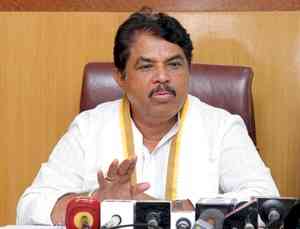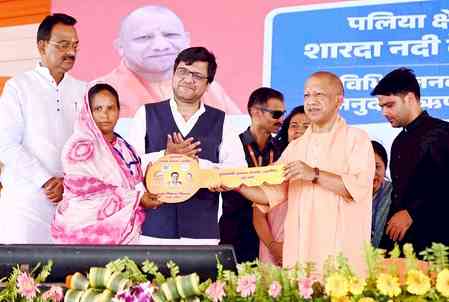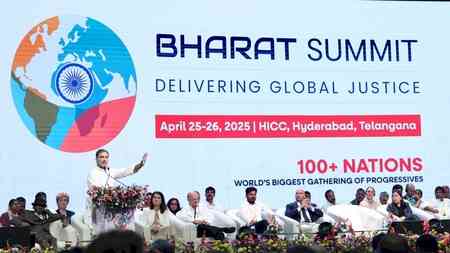TN: DMK workers blacken Hindi letters on Sankarankoil railway station name board
A group of DMK workers, led by Sankarankovil MLA E. Raja, smeared grease over the Hindi letters on the name board of Sankarankoil railway station in Tenkasi district on Monday.

Chennai, Feb 24 (IANS) A group of DMK workers, led by Sankarankovil MLA E. Raja, smeared grease over the Hindi letters on the name board of Sankarankoil railway station in Tenkasi district on Monday.
The incident follows similar acts of defacement at Pollachi and Palayamkottai railway stations on Sunday.
The Railway Protection Force (RPF) has launched an investigation into the matter.
On Sunday, five DMK workers, led by local leader K. Selvaraj, were booked for blackening the Hindi letters on the Pollachi railway station name board.
Additionally, six party members were arrested for defacing the Hindi name board at Palayamkottai railway station, where they also raised slogans opposing the imposition of Hindi.
After a video of the incidents went viral on social media, the RPF booked Selvaraj and his supporters under various sections of the Railway Act, including Section 147 (trespassing), Section 145B (causing nuisance), and Section 166 (defacing public notices).
According to police sources, the accused defaced three name boards in protest against what they perceive as attempts to impose the Hindi language.
When railway police intervened, an argument ensued, with the DMK workers shouting slogans against the Central government’s three-language policy. Despite the protests, railway officials promptly restored the name boards within an hour.
The Palakkad Division of the Southern Railway later confirmed this in a social media post, stating, “The name boards were rectified immediately.”
Meanwhile, the RPF in Tirunelveli has registered cases against six individuals, including Rajavarman, the state deputy secretary of the DMK Engineering Wing, under Sections 147, 166, and 145B of the Railway Act.
The ongoing dispute between Tamil Nadu and the Central government over the implementation of the National Education Policy (NEP) has intensified in recent months.
The DMK government has repeatedly accused the Union Ministry of Education of withholding crucial funds for state-run educational programs.
Tamil Nadu Deputy Chief Minister Udhayanidhi Stalin has reiterated the state’s commitment to the two-language policy (Tamil and English), rejecting the three-language formula proposed in the NEP.
Union Education Minister Dharmendra Pradhan had earlier criticised Tamil Nadu Chief Minister M.K. Stalin for portraying progressive reforms as threats for political gain.
Pradhan urged Stalin to put aside political differences and consider the benefits of NEP for young learners. The controversy extends to funding for education, with Chief Minister M.K. Stalin urging Prime Minister Narendra Modi to release Rs 2,152 crore in Samagra Shiksha Abhiyan (SSA) funds for Tamil Nadu.
In a letter to the Prime Minister, Stalin objected to linking SSA with the PM SHRI scheme, arguing that these are distinct centrally sponsored programs. He contended that the Centre’s approach violates the principles of cooperative federalism and negatively impacts students and teachers in Tamil Nadu.
Stalin further accused the Central government of using financial allocations as leverage to push states into adopting centrally dictated policies.
He urged the Prime Minister to ensure the unconditional release of SSA funds, independent of NEP mandates. The three-language issue remains a contentious topic in Tamil Nadu, with the state’s principal opposition party, AIADMK, also backing the two-language policy.


 IANS
IANS 










